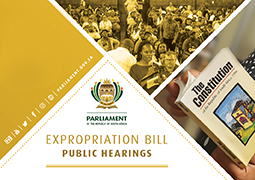
Parliament’s Portfolio Committee on Public Works and Infrastructure acknowledged vigorous inputs from community members who attended the committee’s second public hearings on the Expropriation Bill at Lenyenye Community Hall in Tzaneen last Saturday.
The committee was in Tzaneen on Saturday to afford the people of the Greater Tzaneen Local Municipality, in the Mopani Region of the Limpopo Province, to participate in the country-wide public hearings on the Bill. Participants included representatives of royal traditional councils, civic organisations, the Congress of the South African Trade Unions (Cosatu), the African National Congress (ANC) and the South African Communist Party (SACP).
Although people expressed opposing views on the Bill, an overwhelming majority of participants urged the committee to promptly work towards enacting the Bill.
The Economic Freedom Fighters (EFF) participants appealed to the committee not to waste more time by embarking on the process of public hearings for this Bill, as there is nothing new to contribute. The EFF believes that Parliament was told a long time ago by the people to first deal with amending Section 25 of the Constitution and everything else will follow.
Members of the EFF argued that, instead of any public hearings relating to the amendment of the Bill, Parliament must embark on a nation-wide public awareness programme that Section 25 of the Constitution has been amended. Thereafter, Parliament must deal with the Land Redistribution Bill, Land Tenure Bill and the Expropriation Act.
Agri Letaba, a farmer’s association in the Limpopo Province’s Greater Letaba region, made a contribution in the hearings. They believe that expropriation or compulsory acquisition of land is a tool that has been used internationally for decades. Agri Letaba supports the principle of equality.
Agri Letaba believes current land owners should not be required to bear a disproportionate burden for the need for land reform in the public interest. They added that their main concern with the Bill is that the proposed definition limits the concept to instances where the state acquires rights in property and excludes statutory limitations that undermine the economic utilisation of property or dismantle its content.
The danger of such definition, they argued, is that the government can expropriate any land at any time without compensation. This will severely limit property rights, Agri Letaba said, and the focus should be on the loss that the owner suffers, not on acquisition by state organs.
The overwhelming majority of participants supported the Bill in its current form, particularly clause 12 (c), which allows expropriation without compensation that is just and equitable in terms of the Constitution and in the public interest for property and land earmarked for socio-economic reform and redistribution.
Participants also support that the expropriating authority is the state, since this Bill is about public interest and public purpose. Therefore, it must determine those instances where compensation may be paid (clause 12 A) and where no compensation will be paid (clause 12C). Also, that this is a function of the government not the courts and if anyone has a grievance, they have the right to approach the courts and courts cannot be the ones to make determinations of compensation or no compensation.
In consideration of all this, Ms Nolitha Ntobongwana, the committee Chairperson said, “We welcome and appreciate all the presentations. We thank you for your honesty. The committee will consolidate all the inputs for consideration and deliberation,” she added.
Manelisi Ntsodo
10 April 2021

